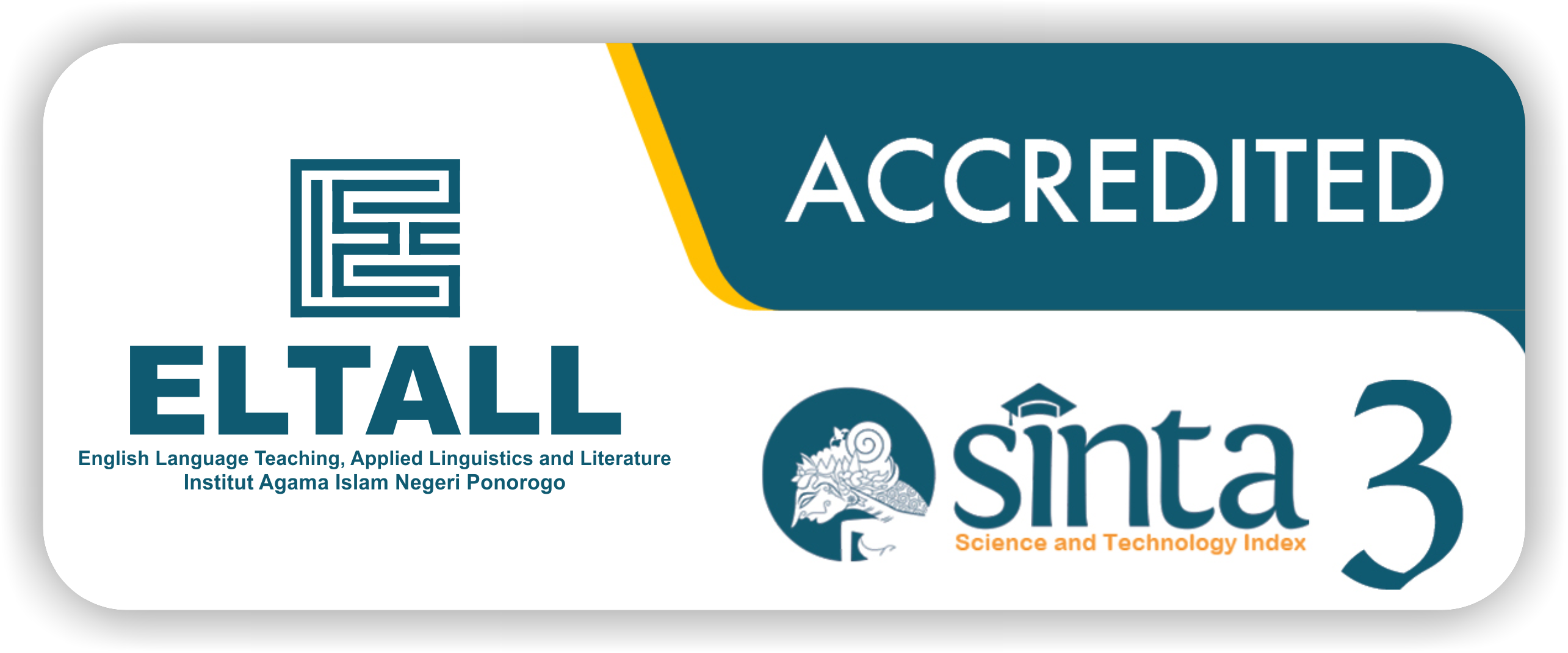THE EFFECTIVENESS OF SOCRATIVE APPLICATION FOR FORMATIVE ASSESSMENT IN TEACHING VOCABULARY AT SMA MUHAMMADIYAH 1 PONOROGO
DOI:
https://doi.org/10.21154/eltall.v1i2.2448Keywords:
socrative application, formative assessment, teaching vocabularyAbstract
The objective of this research was to find out whether there is any significant difference vocabulary mastery between students who used socrative application for formative assessment and who are not used socrative application for formative assessment. This research applied quantitative research approach and used quasi-experimental design. In this research, the researcher used two classes (experimental class and control class) as a sample. The population of eleventh science grade in SMA Muhammadiyah 1 Ponorogo was 115 students. The number of sample in this research was 30 students of experimental class (XI IPA4) and 31 students of control class (XI IPA3). The researcher used simple random sampling to choose the sample in this research. The data were obtained by using a pre-test and post-test. The pre-test was given to both classes before the treatment and the post-test was given after the treatment. After getting the score of pre-test and post-test, the data were analyzed and processed by using T-test formula using SPSS 23 versions for Windows. The result of this research showed that the average of post-test of experimental class is 87.70 and the average score of post-test of control class is 77.74. The value of t-test = 3,226 with df = 59 on level significance 5%. According to the table value “t” = 1,671. Then tcount higher than ttable (3,226 > 1,671). Therefore, H1 is accepted and H0 is rejected. So, it can be concluded that there is significant difference on students’ vocabulary mastery that used socrative application for formative assessment and that are not. In the other words, Socrative Application is effective for formative assessment on students’ vocabulary mastery of eleventh science grade of SMA Muhammadiyah 1 Ponorogo.
Downloads
References
Coca, David Mendez and Josip Slisko. “Software Socrative and Smartphones as Tools for Implementation of Basic Processes of Active Physics Learning in Classroom: An Initial Feasibility Study with Prospective Teachers.” European Journal of Physics Education, Vol 4. 2013.
Ehmadi, Ismail, Abdulghani Al-Hattami and Hala Fawzi. “Using Technology for Formative Assessment to Improve Students’ Learning.” The Turkish Online Journal of Education Technology (TOJET). 2018.
Gangaiamaran, Ramya and Madumathi Pasupathi. “Review on Use of Mobile Apps for Language Learning.” International Journal of Applied Engineering Research. Tamil Nadu: Research India Publication, 2017.
Harmer, Jeremy. The Practice of English Language Teaching Third Edition. London: Pearson Longman, 1997.
Hatch, Evelyn and Cheryl Brown. Vocabulary, Semantics, and Language Education. New York: Cambridge University Press, 1997.
Latif, Mohammad Adnan. Research Methods on Language Learning: An Introduction. Malang: University of Malang Press, 2012.
Maslawati, Mohammad. “Socrative in Teaching Tenses: Indonesian Students and Lecturers’ Perception.” Creative Education. 2019.
Seltman, Howard J. Experimental Design and Analysis. Carnegie: Carnegie Mellon University, 2018.
Terrion, J. L. & V. Aceti, “Perceptions of the Effects of Clickers Technology on Student Learning and Engagement: a Study of Freshmen Chemistry Students.” Research in LearningTechnology. 2012.
Tirlea, Laura et al. “The use of Socrative in Promoting Classroom Engagement: a Qualitative Investigation.” ICOTS. 2018.
Downloads
Published
Issue
Section
License
All articles published in ELTALL (English Language Teaching, Applied Linguistics, and Literature Journal) are licensed under the Creative Commons Attribution-NonCommercial 4.0 International License (CC BY-NC 4.0).
Under this license, authors and readers are free to:
- Share. copy and redistribute the material in any medium or format
- Adapt. remix, transform, and build upon the material
Under the following terms:
- Attribution. You must give appropriate credit, provide a link to the license, and indicate if changes were made. You may do so in any reasonable manner but not in any way that suggests the licensor endorses you or your use.
- Non-Commercial. You may not use the material for commercial purposes.
Notices:
- The licensor cannot revoke these freedoms as long as you follow the license terms.
- No additional restrictions. You may not apply legal terms or technological measures that legally restrict others from doing anything the license permits.
For the full legal code of the license, please visit: https://creativecommons.org/licenses/by-nc/4.0/













